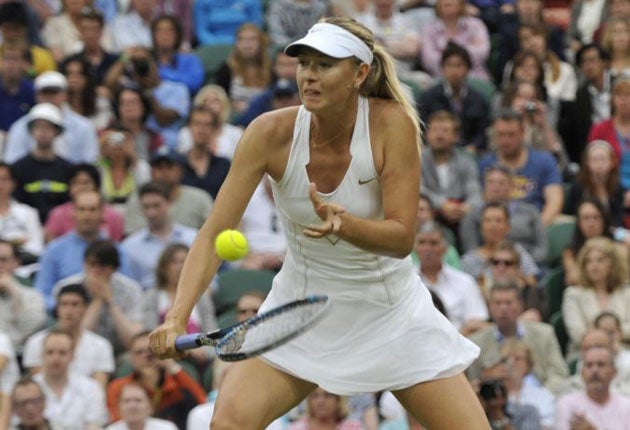James Lawton: Sharapova hits the heights she feared were gone forever

Your support helps us to tell the story
From reproductive rights to climate change to Big Tech, The Independent is on the ground when the story is developing. Whether it's investigating the financials of Elon Musk's pro-Trump PAC or producing our latest documentary, 'The A Word', which shines a light on the American women fighting for reproductive rights, we know how important it is to parse out the facts from the messaging.
At such a critical moment in US history, we need reporters on the ground. Your donation allows us to keep sending journalists to speak to both sides of the story.
The Independent is trusted by Americans across the entire political spectrum. And unlike many other quality news outlets, we choose not to lock Americans out of our reporting and analysis with paywalls. We believe quality journalism should be available to everyone, paid for by those who can afford it.
Your support makes all the difference.Maybe we don't have too much of an option but we should still hear it for – and from – the restored Queen of Wimbledon.
With the Williams sisters heading out of town, the earplugs and the migraine tablets were, when you thought about it, a small enough price for Maria Sharapova's re-assertion of the aura and the nerve she brought here as a 17-year-old champion in 2004.
There has been a lot of pain – not least physical – in the intervening years and just two more Grand Slam titles but for a little while yesterday it was as though her share of angst had been packed away in the baggage of Serena and Venus.
Certainly, no one looked more likely to invade the vacuum left by the Californian hoarders of silverware than Sharapova as she bombarded her Slovakian quarter-final opponent Dominika Cibulkova (below) with ferociously maintained brilliance.
The women's game can only murmur its relief that it heads towards the climax of the most prestigious tournament with a figure of authentic intrigue and competitive allure.
Sharapova's spectacular demolition of the 23-year-old who beat her in straight sets on clay just over a month ago almost matched the racket in a Formula One pit lane, but if the ears were assaulted the eyes were ravished by some sensational ground shots.
No doubt it helped the consistency of her recently crisis-ridden service game – the product of a shoulder injury so serious it kept her out 10 months following surgery – that the 60-minute 6-1, 6-1 triumph came under the Centre Court roof. Sharapova, however, was in a mood to create a storm of considerable violence.
Her tennis was some way from perfect. Occasionally startling power and quite exquisite placement gave way to lapses in concentration. But always there was the sense of a player reaching out for some of her old touch and achievement and later her caution was laced with the most thrilling of possibilities.
Yes, she has to be on her guard against the excellent German Sabine Lisicki in tomorrow's semi-final, but there was no question about the most uplifting fact. It was that after all the years of dwindling optimism, the terrible realisation that her body – contrary to all appearances – was something less than a perfect machine, she could once again see some of those moments of fulfilment she feared had gone for ever.
Sharapova talked about a series of steps, some of them faulty but others as sure as the ones taken in the Centre Court yesterday. She said: "During the injury time I was setting a lot of timetables for myself in terms of wanting to be back for this or that tournament and I never really met those goals.
"And then when you are playing, finally, what you need is patience. You have to accept there is probably never going to be a certain point where you say, 'Oh, I'm back'. I mean, I don't have that much self-esteem. I don't think anyone really does."
What she had yesterday was an old sense of her ability to inflict herself at the highest level of the game.
The Williams had gone with their power and their usually welling self-confidence but here was someone to diminish the sense that the level of competition had suddenly crashed.
"Yes," said Sharapova, "it's good I've experience of getting into the later stages, but I haven't been in them for a while so the feeling is nice and refreshing."
For Wimbledon the feeling is passionately mutual. Yesterday someone asked, politely, if she ever felt like the old lady left in the draw. "No," Sharapova said after offering ironic thanks, "I don't feel a few years make that much of a difference."
In the Centre Court, though, the inclination was to disagree. Going back to the future made all the difference in the world.
Join our commenting forum
Join thought-provoking conversations, follow other Independent readers and see their replies
Comments